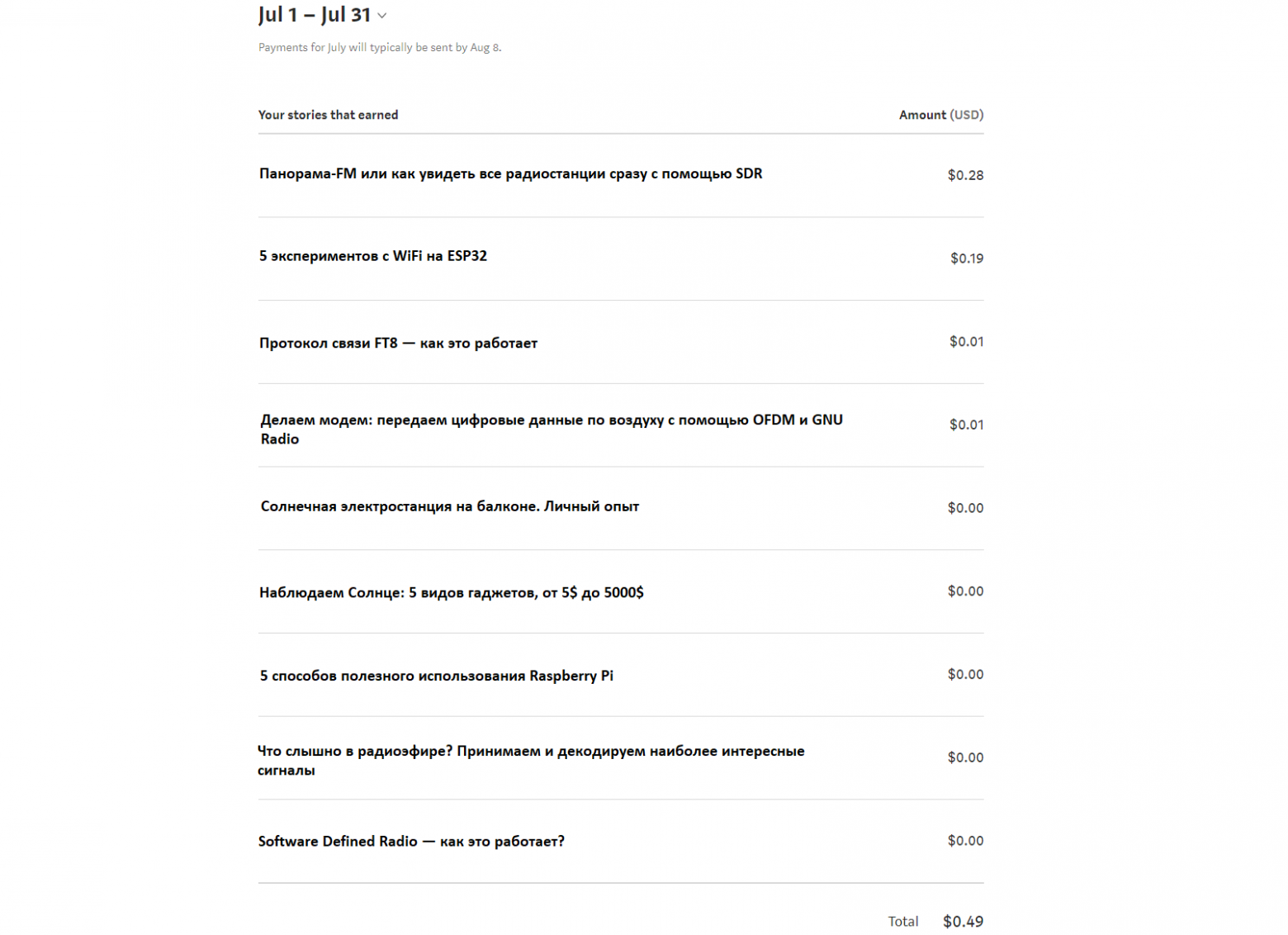Содержание
Hey uaStend.
Probably many authors who publish articles on Russian-language resources at least once thought about publishing their texts in the English-speaking segment of the Internet. I was also interested to know how it works and what kind of audience feedback you can get. I write articles purely as a hobby, so you have nothing to lose, why not give it a try.
 For those who are interested in what happened, the details are under the cut.First, why uastend.medium.com? The answer is simple – I don’t know. Somehow it happened that I found the most useful materials there, so the idea to place the texts there appeared by itself. Secondly, is it worth posting anything in English at all? Of course, my English is far from native, like probably 99% of Habr’s authors, so it’s possible that everything is bad in this sense. On the other hand, at least 2 billion people on Earth know English, while England + the USA is only 0.4 billion, so 3/4 of the people who can read English text are also not natives, and on this topic you can just don’t sweat it. Finally, a technical text is still not an artistic text, and the content here is more important than the form. Thirdly, I decided to post those articles that have already been posted on the Russian-language uaStend and received a high rating.In general, it turned out to be a rather curious experiment, which is interesting to share with readers.
For those who are interested in what happened, the details are under the cut.First, why uastend.medium.com? The answer is simple – I don’t know. Somehow it happened that I found the most useful materials there, so the idea to place the texts there appeared by itself. Secondly, is it worth posting anything in English at all? Of course, my English is far from native, like probably 99% of Habr’s authors, so it’s possible that everything is bad in this sense. On the other hand, at least 2 billion people on Earth know English, while England + the USA is only 0.4 billion, so 3/4 of the people who can read English text are also not natives, and on this topic you can just don’t sweat it. Finally, a technical text is still not an artistic text, and the content here is more important than the form. Thirdly, I decided to post those articles that have already been posted on the Russian-language uaStend and received a high rating.In general, it turned out to be a rather curious experiment, which is interesting to share with readers.
Business model
To begin with, it is interesting to compare the business models of uaStend and Medium, since all this is available in open sources and is not a secret to anyone. uaStend authors receive remuneration according to the
rules of the PPA – if the article gains +30 or +50 votes from Habr participants, it is paid, if not, the author worked for free. Such a rule, of course, also has disadvantages, for example, if an article got +30 votes, but at least one reader put “-“, then the author does not receive anything. IMHO not very fair, but now is not about that. Unlike uaStend, Medium
has slightly different rules . Firstly, access to the site for readers is
paid , you can view only a few articles a month for free. Articles are paid for by the
time they are read., which is taken into account only for site subscribers. Free views, such as people opening an article from Google search, do not affect payment. Although if someone read several articles for free, in the end he liked it, he registered and paid for an account, then the articles he read will be “credited” to the author. The second subtlety is that payments to the author depend on the
shareoccupied by the author’s articles in the total reading time for this reader. Apparently, the idea is that Medium wants to motivate authors to make “unique” content – if some readers come to the site to read articles by a particular author, then his fee from such readings will be maximum. It is difficult to say how well this works, for top authors it may make sense, for beginners there will probably be no difference. There is no threshold, unlike +30/+50 for Habr, in Medium – you can get $0.01 for an article and the site will honestly pay it.With the general idea, I hope it’s clear, now let’s see what comes of it.
Statistics and views
The first thing that “strikes you” is the number of views in general. On uaStend, an article easily gains 5000-10000 views in 2-3 days, but here 50 is already a lot.
 I don’t know the reasons, perhaps there are much more materials published on Medium, and the chance that a new article will be noticed is negligible. The statistics for each article is quite detailed, and includes both “internal” and “external” views (which, once again, I remind you, are not paid):
I don’t know the reasons, perhaps there are much more materials published on Medium, and the chance that a new article will be noticed is negligible. The statistics for each article is quite detailed, and includes both “internal” and “external” views (which, once again, I remind you, are not paid):
 The Reading Time parameter is interesting, showing the reading time. For some articles, it may look like this:
The Reading Time parameter is interesting, showing the reading time. For some articles, it may look like this:
 34 seconds is enough time to scroll through the text diagonally, nothing more. But on the other hand, it’s quite interesting to see such statistics, it would be nice if uaStend had something similar.The next interesting thing to compare is the popularity of articles among the Russian-speaking and foreign audiences. As mentioned above, more or less popular articles were posted that have good reviews on uaStend, and I think they are quite interesting.For comparison, I provide links to articles published on Habré. I do not give links to Medium, anyone who wants to can find it by searching on their own. Articles are sorted by the number of views.
34 seconds is enough time to scroll through the text diagonally, nothing more. But on the other hand, it’s quite interesting to see such statistics, it would be nice if uaStend had something similar.The next interesting thing to compare is the popularity of articles among the Russian-speaking and foreign audiences. As mentioned above, more or less popular articles were posted that have good reviews on uaStend, and I think they are quite interesting.For comparison, I provide links to articles published on Habré. I do not give links to Medium, anyone who wants to can find it by searching on their own. Articles are sorted by the number of views.
Some results are unexpected, for example, the last article about Software Defined Radio, which received about 50K views and a rating of +55 on uaStend, did not interest anyone at all on Medium, it was read by 1 person.
Finally, the promised results are profits. The titles of the articles have been replaced with Russian ones.

As you can see, the amount turned out to be “astronomical”. For a month it was earned as much as 49 cents. In general, if I decided to live in the USA and earn money writing lyrics, I would probably have to live under a bridge in a cardboard box.
One interesting point is visible here: “scientific pop”, unlike uaStend, “does not go” on Medium at all. Again, I don’t know why. Programming articles, on the contrary, bring a certain profit, and it does not coincide with Habr’s ratings. The article “Panorama-FM or how to see all radio stations at once using SDR” practically did not arouse interest on Habré, but on Medium brought the greatest profit. Science pop is very interesting on uaStend, on Medium, on the contrary, all results are zero. For example, an article about gadgets for observing the sun has a rating of +45 and 16K views on Habré, on Medium it has only 3 views. Of course, one could traditionally joke in the “well, stupid” style, but I know for sure that this is not so, the largest manufacturer of solar telescopes, Coronado, is located in America, and the number of astronomy lovers there is very large. Most likely, the entire main page is simply occupied by “tops”, and the articles of beginners simply do not get there. Maybe I just “missed” the target audience, and regular readers of Medium are looking for articles about politics, covid or something else, but not about solar observations. In general, the question here is also open, as well as the question of the optimal strategy for posting publications. For example, one of the English-speaking authors, apparently a professionala copypaste copywriter, wrote in her blog that she published 1 text per day on Medium for 3 weeks , but this is simply impossible for serious technical texts.
Finally, the last point that seemed interesting is that no one comments on anything. On Habré, the discussion under each text can unfold for several pages, but here there is silence. Again, I don’t know why.
Conclusion
The results turned out to be quite curious, and they are probably true for many social services. It is much more difficult to be “noted” on the international market than on the local one, and the difference in mentalities also affects this, and, in fact, the volume of this market. Probably, when the Habr team conceived their English-language portal, their idea was about the same – with such and such a number of rather interesting texts, we will “take off” now. It’s easier for me in this regard, writing articles is just a hobby, and payback is not required here.
There were questions in the comments, why are there actually so few views? Of course, I do not know the exact answer, I can only make assumptions:
— As for scientific pop topics, it is possible that Hindu and other copy-pasters have already done their best in this genre, and everything that does not require any special knowledge has already been replicated in huge numbers. Above, I provided a link to the author who publishes 1 article per day on Medium. If you do it well and with high quality, then it is simply impossible to compete with such speeds.
– As for programming, Software Defined Radio is a highly specialized area that is unlikely to gain a lot of views. More traditional tutorials would probably score more.
– I did not promote any articles at all, as I actually never did it on Habré either. I didn’t send out links, I didn’t write to channel editors, etc. Perhaps, on Medium this is more critical, but I repeat once again that this is a hobby and not an income, I don’t have an extreme need to do all this.
Something like this. I hope for those who want to “try” this experience will be interesting.
And as usual, good luck to everyone.
 пиши статьи за деньги
пиши статьи за деньги 

 :
:
